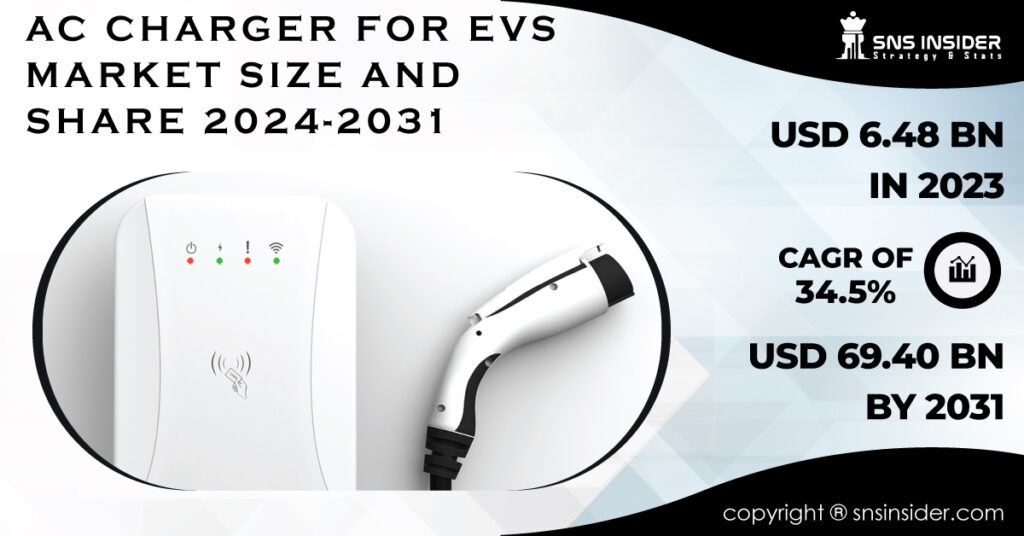
According to SNS Insider, The AC Charger for EVs Market, valued at USD 6.48 Billion in 2023, is anticipated to reach a staggering USD 69.40 Billion by 2031, reflecting a robust compound annual growth rate (CAGR) of 34.5% throughout the forecast period.
AC Charging Dominates Due to Convenience and Affordability
The most common way to power electric cars is by using an ac charger. As electric vehicle adoption accelerates, particularly in emerging economies, the demand for AC chargers is expected to rise significantly. The vast majority of charging stations globally offer AC charging. However, since grid power is delivered in AC format and stored in batteries as DC, onboard chargers in electric vehicles are required to convert AC to DC before feeding it into the battery.
Furthermore, AC chargers are compact compared to DC fast chargers, making them ideal for residential and office use. The growing demand for convenient charging solutions among consumers worldwide is expected to fuel the AC charger for EVs market in the coming years. Additionally, AC chargers are significantly more affordable than DC fast chargers, making them a compelling option for price-sensitive markets like India. This affordability is expected to contribute to market growth in the coming years.

AC-Charger-for-EVs-Market
Get a Free Sample PDF Copy of the Latest Research @ https://www.snsinsider.com/sample-request/1031
Market Driven by Rising Electric Vehicle Sales and Government Support
The AC charger for EVs market is surging due to booming electric vehicle sales. Stringent government regulations and attractive incentives are driving consumers towards eco-friendly electric vehicles. Global sales doubled in 2021, reaching a record 6.6 million units. Additionally, factors like decreasing battery costs (down 85% in a decade) and rising fuel prices are fueling the shift to EVs. This, in turn, is creating a strong demand for AC chargers, as governments worldwide invest heavily in bolstering charging infrastructure. The US plans to invest $5 billion, while the UK aims to have 300,000 public chargers by 2030. This focus on combating climate change positions the AC charger market for significant growth.
Segment Analysis: Residential Charging Holds Dominant Position
By End-user
- Residential Charging
- Commercial Charging
End-user: Residential charging is the dominant sub-segment in the AC charger for EVs market by end-user, holding around 60-70% of the market share. This dominance is primarily due to the fact that a significant portion of EV charging occurs overnight at home, where convenience and affordability are key considerations. Standard AC chargers installed in garages or carports effectively fulfill this need
By Vehicle Type
- BEV
- PHEV
Vehicle Type: BEV (Battery Electric Vehicle) is the dominant sub-segment in the AC charger for EVs market by vehicle type due to their growing popularity and longer range compared to PHEVs (Plug-in Hybrid Electric Vehicles). As BEV sales continue to climb, the demand for AC chargers to support their charging needs will correspondingly increase.
By Product
- Standard Charger
- Fast Charger
Product: Standard chargers are the dominant sub-segment in the AC charger for EVs market by product. These chargers provide a good balance between charging time and cost, making them suitable for overnight charging at home or workplaces. While fast chargers are gaining traction, their higher installation cost and limited applicability for everyday charging scenarios keep standard chargers in the lead for now.
Enquiry or Share Your Questions If Any Before Purchasing This Report @ https://www.snsinsider.com/enquiry/1031
Headwinds from Geopolitical Tensions and Economic Uncertainty Cloud AC Charger Market Growth
The AC charger for EVs market faces challenges due to the war in Russia and Ukraine, as well as potential economic slowdowns. Disruptions in the supply chain for key battery materials and automotive parts can lead to higher production costs and potentially slow EV production, impacting AC charger demand. Additionally, energy price volatility caused by the war can make electric vehicles seem less cost-effective in the short term, further discouraging EV purchases. Economic downturns can also dampen consumer spending on EVs and reduce government/business investments in charging infrastructure, hindering AC charger market growth. However, continued government incentives for EVs, growing environmental concerns, and advancements in AC charger technology that reduce charging times and costs can help mitigate these negative impacts.
Key Regional Developments
The Asia Pacific region reigns supreme in the AC charger market, capturing a staggering 55-60% share. This dominance stems from a trifecta of factors: government incentives pushing EV adoption, a strong focus on green mobility initiatives, and a booming automotive industry. Europe follows closely, driven by ambitious EV targets, heavy investments in charging infrastructure, and a regional emphasis on sustainability. North America boasts the fastest growth rate due to rising government support for EVs, increasing environmental awareness among consumers, and the launch of exciting new EV models by major automakers.
Established Players and Rising Stars Drive Innovation in the AC Charger for EVs Market
The AC charger for EVs market landscape is populated by a diverse range of established and emerging players. Leading names include ABB, Siemens, and ChargePoint, Inc., alongside companies like Leoni AG, TE Connectivity, and BESEN Group. Additionally, Proterra, Kempower OY, and Aptiv are making their mark in the market. Notably, car manufacturers like Tesla are also involved, while European players like Phoenix Contact and EFACEC hold a strong presence. This mix of global giants, regional specialists, and innovative startups is driving continuous development and competition within the AC charger for EVs market.
Key Insights from the AC Charger for EVs Market Study:
- The AC charger for EVs market is expected to witness significant growth due to rising electric vehicle sales and government support for charging infrastructure.
- Residential charging is the dominant segment due to the convenience and affordability of charging EVs at home.
- BEVs are the dominant vehicle type due to their growing popularity and longer range.
- Standard chargers are the dominant product type due to their balance between cost and charging time.
- The Russia-Ukraine war and economic slowdowns pose challenges, but government incentives, environmental concerns, and technological advancements can mitigate their impact.
- The Asia Pacific region dominates the market, followed by Europe and North America (with the fastest growth rate).
Prominent Key Players of AC Charger for EVs Market
- ABB Ltd.
- ChargePoint, Inc.
- Leviton Manufacturing Co., Inc.
- Blink Charging Co.
- Tesla Inc.
- Webasto Group
- bp pulse
- Eaton Corporation plc
- Schneider Electric, Inc.
- Siemens
- BTC Power
- Delta Electronics, Inc.
- Tritium DCFC Limited
Recent Developments
July 2022: ChargePoint partnered with Charge Across Town and the State of California to deploy over 100 EV chargers at residential properties. ChargePoint was awarded USD 4.25 million for this project by the California Energy Commission. The deployed models will include CPF50 and CT4000 electric charging ports, with 75% reserved for low-income or disadvantaged communities.
September 2022: Blink Charging Co. signed a mutual service agreement with UBS Asset Management’s Real Estate and Private Markets business. This initiative aims to provide UBS tenants with access to the latest EV charging technology for fast, affordable charging.
To know about the Research Methodology @ https://www.snsinsider.com/reports/ac-charger-for-evs-market-1031
Our Related Report


